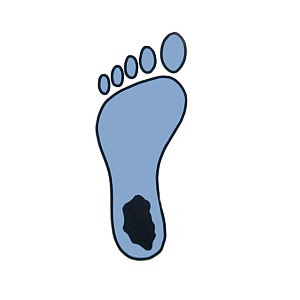
You know how I lose my train (choo! choo!) of thought with regular frequency? I am fascinated more by the journey from A-to-B than by the endpoints.
I set out to learn more about the medieval city of L'Aquila, epicenter of the recent earthquake in the Abruzzo region of Italy.
In the process (there where I am truly at my best), I ran into some interesting blogs and news articles having nothing, of course, to do with the tragedy. A decision had to be made.
So... here is the link to the Italian arm of the International Red Cross, which is all that really matters right now -- that is, that aid be rendered. Perhaps you feel more comfortable dealing with the American Red Cross International Response Fund.
It feels unsavory to concentrate on the ancient rubble and not the people of L'Aquila, at least 150 of whom perished in the quake.
I will study the city at some later time. I am attracted to any place that can speak honestly of its "ramparts." My decision to become a dix-huitièmiste came at the expense of a strong interest in things medieval -- not in the least a "dark" age.
It's enough, for now, to read:
Some of its most revered buildings were badly affected by the 6.3 magnitude earthquake.
Among them was Government House, a pale pink building turned into a pile of concrete and dust. At least four Romanesque and Renaissance churches were badly damaged by the tremor.
The 13th century Basilica of Santa Maria di Collemaggio lost a wall, while a section of the nave collapsed.
The church, with a pink-and-white facade combining Romanesque and Gothic architecture, played host to the crowning of Pope Celestine V in 1294 and still attracts thousands of pilgrims every year.
Slightly further north, the belltower of the largest Renaissance church in Abruzzo - Basilica of San Bernardino - was destroyed, while the 16th century castle housing the region's national museum was damaged.
Yesterday's devastation was a brutal reminder of how vulnerable the city is to the power of earthquakes - just over 300 years since it was virtually flattened in a similar tremor.
Earlier quakes in 1349, 1461 and 1646 had repeatedly shattered the centre of what was once a powerful medieval city.
L'Aquila was founded in the mid 13th century by the Holy Roman Emperor Frederick II and construction continued during the reign of his son Conrad IV.
Such was its importance, it went on to become the second city of the Kingdom of Naples.
Its position close to Rome - just 60 miles north east - placed it in the front line of rivalry between monarchic and papal interests.
The city was destroyed and even temporarily abandoned at one point during the mid 13th century before it was rebuilt with new fortifications.
It flourished through the trade in wool and silk and was home to one of Europe's earliest printing presses.
L'Aquila's importance waned as a result of economic strangulation during rebellion against Spanish rule in the 16th century and later because of its resistance to French occupation in the 18th century.
But the centre flourished again during the 19th century moves toward the unification of Italy which left it as regional capital.
Now... some of those interesting news and opinion pieces encountered on the road to L'Aquila!
Clergy attended a meeting last month to hear about the work of The
International Commission of English in the Liturgy, which is producing a new
English translation of the Latin mass which will be used in churches next year.
Priests at the meeting... were told to question whether it was appropriate to say "good morning" once the priest was on the altar and had made the sign of the cross...
A spokesman for the diocese said: "The review of the liturgy is looking at whether there are elements of the service that have become a bit too distracting.
"People might argue that if you go in to a house, you say 'hi', but the priest is not going in to a house. He is going in to a sacred service. We need to emphasise that the priest is president of the community and is presiding at the service.
"It is a debate that has been going on in the Church for a long time – are we doing a cabaret or are we actually celebrating the Eucharist?
"The fear is that if some guidance is not given and general decisions are not put down, the interpretation of the liturgy leads to unsuitable things, like strobe lights and girls in hotpants. The aim of the new translation is to bring more dignity to the service."
Strobe lights and girls in hotpants? We've really been missing out on the fun, apparently.
One day, I will take the time to tell you about The War Between Father Anthony and La Bonne et Belle Bianca Castafiore, a war ended by the simple ministrations of Brother William. What can I say? She used to vacation at the local monastery!
Let's just say that Father Anthony is in dire need of a lap dance.
Why! He's in luck! The Church, in its wisdom, has taken care of every eventuality:
ROME, April 4 (UPI) -- An Italian lap dancer-turned-nun will perform in front of a group of Roman Catholic cardinals and bishops.
Anna Nobili, 38, who gave up years of exotic dancing in Milan after a 2002 visit to the shrine of St. Francis in Assisi, joined an order of nuns called the Sister Workers of the Holy House of Nazareth.
Sister Nobili, as she is now known, said she practices a form of "mystical" choreography she calls "Holy Dance," The Daily Telegraph reported Saturday.
And I will sign off with the following bit of news -- and let me say this: I am proud that the Catholic Church continues to fight the Right Fight on behalf of science.
The United States Conference of Catholic Bishops has issued guidelines calling Reiki therapy "unscientific and inappropriate for Catholic institutions."
As a result of the ruling, at least two Catholic medical centers in South Jersey -- Lourdes Wellness Center in Collingswood and the Lourdes Cancer Center in Westampton -- will stop offering Reiki to patients, spokeswoman Wendy Marano said Wednesday.
The centers are part of the Lourdes Health System, sponsored by the Franciscan Sisters of Alleghany, N.Y.
Reiki is a mind-body healing method developed in Japan during the late 1800s. Used to complement traditional medicine, the technique has gained popularity in recent years.
According to Reiki teaching, illness and stress are caused by a disruption or imbalance in a person's life energy; Reiki works to correct the imbalance.
Announced March 26, the new guidelines used strong language to denounce Reiki, stating: "Superstition corrupts one's worship of God by turning one's religious feeling and practice in a false direction. While sometimes people fall into superstition through ignorance, it is the responsibility of all who teach in the name of the Church to eliminate such ignorance as much as possible."
For real! Forget that Galileo nonsense, and look toward the Guiding Light of the Jesuits. Ignore that stuffy old Catholic Encyclopedia itself: "When a clearly defined dogma contradicts a scientific assertion, the latter has to be revised."
Ah, but we *are* talking about Reiki, eh? You know,channelling energy through the practitioner to the patient? Recipe-like revelations such as: "If you treat a patient with one hand, he will receive half the energy he will receive if treated with both hands. The quality will not be altered. The quantity will be halved."
The heresy of invoking "the Ancients" 'n all. Well, major props to the Priestie Boys for pulling the knickers down on these hoaxers. It is this same intellectual rigor that strengthens and steels and girds Catholics against the evils of witchcraft and abortion.
So that was my whirlwind exposure to what passes for news today.
May they keep finding survivors in L'Aquila.




